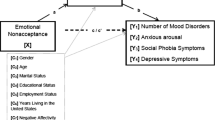Abstract
The present investigation examined the interactive effects of rumination and negative affectivity in relation to anxiety and depressive symptoms and psychopathology among 245 Latino adults (M age = 39.7, SD = 11.4; 86.9 % female; 97.6 % reported Spanish as their first language) attending a community-based primary healthcare clinic. As expected, there was a significant interaction between rumination and negative affectivity for depressive, suicidal, social anxiety, anxious arousal symptoms, number of mood and anxiety disorders, and disability among the primary care Latino sample. Inspection of the interaction forms indicated a high degree of conceptual similarity. Specifically, rumination was related to greater levels of suicidal symptoms, social anxiety, anxious arousal, number of mood and anxiety disorders, and disability among individuals with higher, but not lower, levels of negative affectivity. The form of the interaction for depressive symptoms was in line with this pattern, but more extreme; rumination was related to greater levels of depressive symptoms among individuals with both higher and lower levels of negative affectivity. Together, these data provide novel empirical evidence suggesting that there is clinically relevant interplay between rumination and negative affectivity in regard to a relatively wide array of anxiety and depressive variables among Latinos in a primary care medical setting.


Similar content being viewed by others
References
PRC. Statistical Portrait of Hispanics in the United States: Pew Research Center 2012.
USDHHS. Mental health: culture, race, and ethnicity—a supplement to mental health: a report of the surgeon general, Center for Mental Services. Rockville, MD.: U.S. Department of Health and Human Services, Substance Abuse and Mental Health Services Administration 2001.
Miranda J, Green BL. The need for mental health services research focusing on poor young women. The Journal of Mental Health Policy and Economics. 1999;2(2):73–80.
Ojeda VD, McGuire TG. Gender and racial/ethnic differences in use of outpatient mental health and substance use services by depressed adults. Psychiat Quart. 2006;77(3):211–22.
López SR, Barrio C, Kopelowicz A, Vega WA. From documenting to eliminating disparities in mental health care for Latinos. Am Psychol. 2012;67(7):511.
Alegría M, Chatterji P, Wells K, Cao Z, Chen C-n, Takeuchi D, et al. Disparity in depression treatment among racial and ethnic minority populations in the United States. Psychiat Serv. 2008;59(11):1264.
Grant BF, Stinson FS, Hasin DS, Dawson DA, Chou SP, Anderson K. Immigration and lifetime prevalence of DSM-IV psychiatric disorders among Mexican Americans and Non-Hispanic whites in the United States: results from the national epidemiologic survey on alcohol and related conditions. Arch Gen Psychiatry. 2004;61(12):1226–33.
Vega WA, Kolody B, Aguilar-Gaxiola S, Alderete E, Catalano R, Caraveo-Anduaga J. Lifetime prevalence of DSM-III-R psychiatric disorders among urban and rural Mexican Americans in California. Arch Gen Psychiat. 1998;55(9):771–8.
Miranda J, Cooper LA. Disparities in care for depression among primary care patients. J Gen Appl Microbiol. 2004;19(2):120–6.
Kanter JW, Santiago-Rivera AL. Rusch LC. Busch AM: West P. Initial outcomes of a culturally adapted behavioral activation for Latinas diagnosed with depression at a community clinic. Behav Modif; 2010.
Vega WA, Lopez SR. Priority issues in Latino mental health services research. Ment Health Serv Res. 2001;3(4):189–200.
Lagomasino IT, Dwight-Johnson M, Miranda J, Zhang L, Liao D. Duan N et al. Psychiat Serv: Disparities in depression treatment for Latinos and site of care; 2014.
Miranda J, Azocar F, Organista KC, Dwyer E, Areane P. Treatment of depression among impoverished primary care patients from ethnic minority groups. Psychiat Serv. 2003;54(2):219–25. doi:10.1176/appi.ps.54.2.219.
Muñoz RF, Ying Y-W, Bernal G, Pérez-Stable EJ, Sorensen JL, Hargreaves WA, et al. Prevention of depression with primary care patients: a randomized controlled trial. Am J Commun Psychol. 1995;23(2):199–222.
Collado A, Castillo SD, Maero F, Lejuez C, MacPherson L. Pilot of the brief behavioral activation treatment for depression in Latinos with limited English proficiency: preliminary evaluation of efficacy and acceptability. Behav Ther. 2014;45(1):102–15.
Collado A, Long KE, MacPherson L, Lejuez CW. The efficacy of a behavioral activation intervention among depressed US Latinos with limited English language proficiency: study protocol for a randomized controlled trial. Trials. 2014;15(1):231.
Chavira DA, Golinelli D, Sherbourne C, Stein MB, Sullivan G, Bystritsky A, et al. Treatment engagement and response to CBT among Latinos with anxiety disorders in primary care. J Consult Clin Psych. 2014;82(3):392–403. doi:10.1037/a0036365.
Chapa T Mental health services in primary care settings for racial and ethnic minority populations. September Office of Minority Health: Draft Issue Brief; 2004.
Doty MM, Ives BL, Fund C. Quality of health care for Hispanic populations: findings from the commonwealth fund 2001 health care quality survey. Commonwealth Fund; 2002.
Watson D Mood and temperament: Guilford Press; 2000.
Clark LA, Watson D, Mineka S. Temperament, personality, and the mood and anxiety disorders. J Abnorm Psychol. 1994;103(1):103.
Gamez W, Watson D, Doebbeling BN. Abnormal personality and the mood and anxiety disorders: implications for structural models of anxiety and depression. J Anxiety Disord. 2007;21(4):526–39.
Stanton K, Watson D. Positive and negative affective dysfunction in psychopathology. Soc Personal Psychol Compass. 2014;8(9):555–67.
Watson D, Naragon-Gainey K. Personality, emotions, and the emotional disorders. Clinical Psychological Science. 2014;2(4):422–42.
Watson D, Pennebaker JW. Health complaints, stress, and distress: exploring the central role of negative affectivity. Psychol Rev. 1989;96(2):234.
Watson D, Clark LA, Tellegen A. Cross-cultural convergence in the structure of mood: a Japanese replication and a comparison with US findings. J Pers Soc Psychol. 1984;47(1):127.
Zvolensky MJ, Kotov R, Antipova AV, Schmidt NB. Diathesis stress model for panic-related distress: a test in a Russian epidemiological sample. Behav Res Ther. 2005;43(4):521–32.
Granillo T, Jones-Rodriguez G, Carvajal SC. Prevalence of eating disorders in Latina adolescents: associations with substance use and other correlates. J Adolesc Health. 2005;36(3):214–20.
Chorpita BF, Barlow DH. The development of anxiety: the role of control in the early environment. Psychol Bull. 1998;124(1):3.
Barlow DH, Raffa SD, Cohen EM. Psychosocial treatments for panic disorders, phobias, and generalized anxiety disorder. A Guide to Treatments That Work. 2002;2:301–66.
Morrow J, Nolen-Hoeksema S. Effects of responses to depression on the remediation of depressive affect. J Pers Soc Psychol. 1990;58(3):519.
Aldao A, Nolen-Hoeksema S, Schweizer S. Emotion-regulation strategies across psychopathology: a meta-analytic review. Clin Psychol Rev. 2010;30(2):217–37.
Baer RA, Sauer SE. Relationships between depressive rumination, anger rumination, and borderline personality features. Pers Disord Theory Res Treat. 2011;2(2):142.
Nolen-Hoeksema S, Wisco BE, Lyubomirsky S. Rethinking rumination. Perspect Psychol Sci. 2008;3(5):400–24.
Lyubomirsky S, Layous K, Chancellor J, Nelson SK. Thinking about rumination: the scholarly contributions and intellectual legacy of Susan Nolen-Hoeksema. Annu Rev Clin Psycho. 2015;11:1–22.
Nolen-Hoeksema S Responses to depression and their effects on the duration of depressive episodes. J Abnorm Psychol. 1991;100(4):569.
Cheref S, Lane R, Polanco-Roman L, Gadol E, Miranda R. Suicidal ideation among racial/ethnic minorities: moderating effects of rumination and depressive symptoms. Cult Divers Ethn Min. 2015;21(1):31–40. doi:10.1037/a0037139.
Pimentel M, Cova F. Efectos de la rumiación y la preocupación en el desarrollo de sintomatología depresiva y ansiosa en estudiantes universitarios de la ciudad de concepción. Chile Terapia Psicológica. 2011;29(1):43–52.
Cova Solar F, Rincón P, Melipillán R. Rumiación y presencia de sintomatología ansiosa y depresiva en adolescentes. Revista Mexicana de Psicología. 2007;24(2):175–83.
Cova F, Rincón P, Melipillán R. Reflexión, rumiación negativa y desarrollo de sintomatología depresiva en adolescentes de sexo femenino. Terapia Psicológica. 2009;27(2):155–60.
Nicolai KA, Wielgus MD, Mezulis A. Identifying risk for self-harm: rumination and negative affectivity in the prospective prediction of nonsuicidal self-injury. Suicide Life Threat Behav. 2015.
Selby EA, Franklin J, Carson-Wong A, Rizvi SL. Emotional cascades and self-injury: investigating instability of rumination and negative emotion. J Clin Psychol. 2013;69(12):1213–27.
Nolen-Hoeksema S, Morrow J, Fredrickson BL. Response styles and the duration of episodes of depressed mood. J Abnorm Psychol. 1993;102(1):20.
Feldner MT, Leen-Feldner EW, Zvolensky MJ, Lejuez C. Examining the association between rumination, negative affectivity, and negative affect induced by a paced auditory serial addition task. J Behav Ther Exp Psychiatry. 2006;37(3):171–87.
Lecrubier Y, Sheehan D, Weiller E, Amorim P, Bonora I, Harnett Sheehan K, et al. The mini international neuropsychiatric interview (MINI). a short diagnostic structured interview: reliability and validity according to the CIDI. Eur Psychiat. 1997;12(5):224–31.
Butcher JN. International adaptations of the MMPI-2: research and clinical applications: University of Minnesota Press; 1996.
Clark LA, Shiota N. Adaptation and validation of the Japanese MMPI-2. 1996.
Sheehan D, Lecrubier Y, Harnett Sheehan K, Janavs J, Weiller E, Keskiner A, et al. The validity of the MINI international neuropsychiatric interview (MINI) according to the SCID-P and its reliability. Eur Psychiat. 1997;12(5):232–41.
Nolen-Hoeksema S, Morrow J. A prospective study of depression and posttraumatic stress symptoms after a natural disaster: the 1989 Loma Prieta earthquake. J Pers Soc Psychol. 1991;61(1):115–21.
Extremera N, Fernandez-Berrocal P. Validity and reliability of spanish versions of the ruminative responses scale-short form and the distraction responses scale in a sample of Spanish high school and college students. Psychol Rep. 2006;98(1):141–50. doi:10.2466/pr0.98.1.141-150.
Watson D, Clark LA, Tellegen A. Development and validation of brief measures of positive and negative affect: the PANAS scales. J Pers Soc Psychol. 1988;54(6):1063. doi:10.1637/10T0-3590.19.3.253.
Watson D, Clark LA, Tellegen A. Development and validation of brief measures of positive and negative affect: the PANAS scales. J Pers Soc Psychol. 1988;54(6):1063–70. doi:10.1037/0022-3514.54.6.1063.
Zvolensky MJ, Bakhshaie J, Garza M, Valdivieso J, Ortiz M, Bogiaizian D, et al. Anxiety sensitivity and subjective social status in relation to anxiety and depressive symptoms and disorders among Latinos in primary care. J Anxiety Disord. 2015;32(0):38–45. doi:10.1016/j.janxdis.2015.03.006.
Watson D, O’Hara MW, Simms LJ, Kotov R, Chmielewski M, McDade-Montez EA, et al. Development and validation of the inventory of depression and anxiety symptoms (IDAS). Psychol Assess. 2007;19(3):253. doi:10.1637/10T0-3590.19.3.253.
Watson D, O’Hara MW, Simms LJ, Kotov R, Chmielewski M, McDade-Montez EA, et al. Development and validation of the inventory of depression and anxiety symptoms (IDAS). Psychol Assess. 2007;19(3):253.
Watson D, O’Hara MW, Chmielewski M, McDade-Montez EA, Koffel E, Naragon K, et al. Further validation of the IDAS: evidence of convergent, discriminant, criterion, and incremental validity. Psychol Assess. 2008;20(3):248.
Zvolensky MJ, Bogiaizian D, Salazar PL, Farris SG, Bakhshaie J. An anxiety sensitivity reduction smoking-cessation program for Spanish-speaking smokers (Argentina). Cogn Behav Pract. 2014;21(3):350–63.
Sheehan D The sheehan disability scales. The Anxiety disease and how to Overcome it. 1983;151.
Sheehan KH, Sheehan DV. Assessing treatment effects in clinical trials with the discan metric of the Sheehan disability scale. Int Clin Psychopharmacol. 2008;23(2):70–83.
Luciano JV, Bertsch J, Salvador-Carulla L, Tomás JM, Fernández A, Pinto-Meza A, et al. Factor structure, internal consistency and construct validity of the Sheehan disability scale in a Spanish primary care sample. J Eval Clin Pract. 2010;16(5):895–901.
Aiken LS, West SG, Reno RR. Multiple regression: testing and interpreting interactions. Thousand Oaks, CA, U.S.: Sage Publication, Inc; 1991.
Davis RE, Resnicow K, Couper MP. Survey response styles, acculturation, and culture among a sample of Mexican American adults. J Cross Cult Psychol. 2010;0022022110383317.
Alegria M, Canino G, Shrout PE, Woo M, Duan N, Vila D, et al. Prevalence of mental illness in immigrant and non-immigrant US Latino groups. Am J Psychiat. 2008;165(3):359–69.
Acknowledgments
Funding for the study was from an endowment awarded to Dr. Zvolensky. This work has not been presented previously in any form. No authors have any conflicts of interests or financial disclosures to report. The study was approved by Institutional Review Board at the University of Houston. Informed written consent was obtained prior to initiating study procedures. No animals have been employed in this research.
Author information
Authors and Affiliations
Corresponding author
Rights and permissions
About this article
Cite this article
Zvolensky, M.J., Paulus, D.J., Bakhshaie, J. et al. Interactive Effect of Negative Affectivity and Rumination in Terms of Mental Health Among Latinos in Primary Care. J. Racial and Ethnic Health Disparities 3, 646–657 (2016). https://doi.org/10.1007/s40615-015-0183-y
Received:
Accepted:
Published:
Issue Date:
DOI: https://doi.org/10.1007/s40615-015-0183-y




